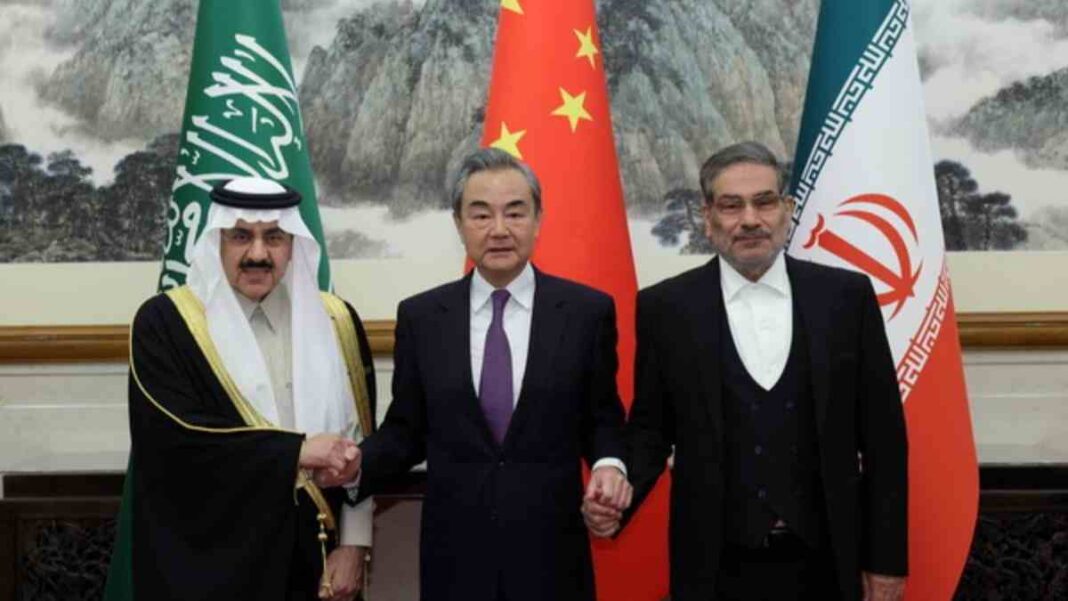SAUDI ARABIA/IRAN: Iran and Saudi Arabia agreed to mend ties again on Friday after years of hostility that threatened Gulf peace and security and fueled conflicts in the Middle East, from Yemen to Syria. The deal, which was made possible by China, was made public after four days of secret talks between the top security officials of the two rival Middle Eastern powers in Beijing.
Iran, Saudi Arabia, and China said in a joint statement that Tehran and Riyadh had agreed to start talking to each other again and reopen their embassies within two months. The agreement “includes their affirmation of respect for the sovereignty of states and their non-interference in internal affairs,” it said.
In 2016, Saudi Arabia cut ties with Iran after an attack on its embassy there. The attack happened when the two countries were fighting over Riyadh’s execution of a Shi’ite Muslim cleric.
Iran has also been held responsible by the kingdom for attacks on tankers in Gulf waters, as well as missile and drone strikes on its oil installations in 2019. Tehran refuted the accusations.
The Houthi movement in Yemen, which is backed by Iran, has also sent missiles and drones across the border to attack Saudi Arabia, which is leading a coalition fighting the Houthis. In 2022, the attacks were also sent to the United Arab Emirates.
In a deal signed on Friday, Saudi Arabia’s national security advisor Musaed bin Mohammed Al-Aiban and Iran’s top security official Ali Shamkhani agreed to revive a 2001 security cooperation agreement as well as another earlier trade, economy, and investment agreement.
Wang Yi, the top official in China, praised the agreement as a success for dialogue and peace, and he promised that Beijing would continue to help solve tough problems around the world.
John Kirby, a spokesman for national security policy at the White House, said Saudi Arabia had kept Washington informed about the negotiations in Beijing but that Washington had not taken an active part. He said that Washington had backed the initiative to bring an end to the conflict in Yemen.
“This is not about China. We support any effort to de-escalate tensions in the region. We think that’s in our interests, and it’s something that we worked on through our own effective combination of deterrence and diplomacy,” said Kirby.
Long-term strategic ties between Riyadh and Washington have become tense under President Joe Biden’s leadership because of the kingdom’s record on human rights, the war in Yemen, and, more recently, relations with Russia and OPEC+ oil output.
On the other hand, President Xi Jinping’s high-profile trip to Saudi Arabia three months ago showed how close ties are between China and that country. The news came out on Friday, the same day that Xi won a third term as China’s president, despite many problems.
Long at odds, the two main Shi’ite and Sunni Muslim nations in the Middle East, Iran and Saudi Arabia, have supported opposing sides in proxy wars in places like Yemen and Syria.
As Iran tries to thwart American efforts to isolate it in the region and Saudi Arabia tries to concentrate on economic development, analysts say both parties stand to gain from de-escalation.
Iraq, Egypt, and Turkey, along with the United Arab Emirates, Oman, Qatar, Bahrain, and Kuwait, were happy to hear that Saudi Arabia and Iran were able to get along again.
Saudi Arabia’s foreign minister, Prince Faisal bin Farhan Al Saud, declared in remarks aired on state television that Riyadh “favours political solutions and dialogue.”
Hossein Amirabdollahian, Iran’s foreign minister, hinted at more to come.
Amirabdollahian tweeted, “The neighbourhood policy, as the key axis of the Iranian government’s foreign policy, is strongly moving in the right direction, and the diplomatic apparatus is actively behind the preparation of more regional steps.”
Saudi Arabia and its allies have long pushed global powers to resolve their concerns about Iran’s missile and drone programmes to restore the 2015 nuclear agreement with Tehran.
Prince Faisal announced in January that efforts to put a stop to the Yemeni conflict were progressing, and on Friday, the Iran-aligned Hezbollah in Lebanon and the Houthis in Yemen both welcomed the deal.
Also Read: Iranian Authorities to Investigate ‘Revenge’ Poisoning of Schoolgirls



